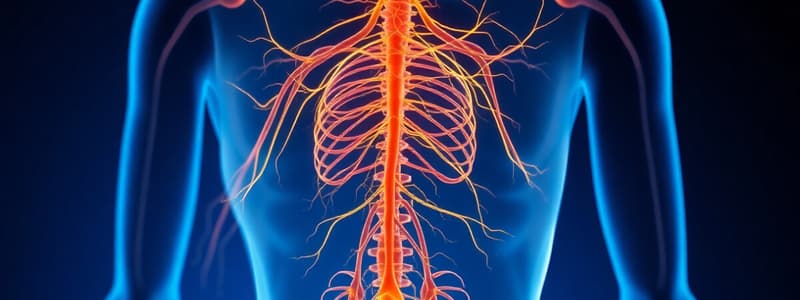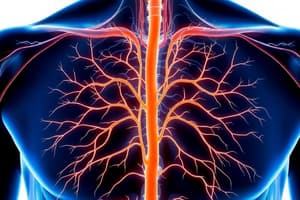Podcast
Questions and Answers
What is the somatic nervous system responsible for?
What is the somatic nervous system responsible for?
Voluntary control of body movements and reflex actions via skeletal muscles.
How many segments of nerves are in the somatic nervous system?
How many segments of nerves are in the somatic nervous system?
- 31
- 43 (correct)
- 12
- 5
The somatic nervous system consists only of efferent (motor) nerves.
The somatic nervous system consists only of efferent (motor) nerves.
False (B)
What is a monosynaptic reflex arc?
What is a monosynaptic reflex arc?
Which of the following is NOT a component of the autonomic nervous system?
Which of the following is NOT a component of the autonomic nervous system?
Name the three divisions of the autonomic nervous system.
Name the three divisions of the autonomic nervous system.
The autonomic nervous system is involved in voluntary control over the body's functions.
The autonomic nervous system is involved in voluntary control over the body's functions.
Which neurotransmitter does the somatic nervous system primarily involve?
Which neurotransmitter does the somatic nervous system primarily involve?
Match the following components with their corresponding system:
Match the following components with their corresponding system:
What is the somatic nervous system responsible for?
What is the somatic nervous system responsible for?
Which of the following nerves are part of the somatic nervous system?
Which of the following nerves are part of the somatic nervous system?
What are the components of the somatic nervous system?
What are the components of the somatic nervous system?
The autonomic nervous system regulates voluntary processes.
The autonomic nervous system regulates voluntary processes.
What are the three divisions of the autonomic nervous system?
What are the three divisions of the autonomic nervous system?
The somatic nervous system controls _______ movements.
The somatic nervous system controls _______ movements.
The autonomic nervous system controls _______ movements.
The autonomic nervous system controls _______ movements.
How many efferent neurons are involved in autonomic nervous system signaling?
How many efferent neurons are involved in autonomic nervous system signaling?
Flashcards
Somatic Nervous System
Somatic Nervous System
Part of the peripheral nervous system controlling voluntary movements of skeletal muscles.
Autonomic Nervous System
Autonomic Nervous System
Part of the peripheral nervous system controlling involuntary functions like heart rate and digestion.
Reflex Arc
Reflex Arc
Neural pathway for involuntary movements in response to stimuli.
Peripheral Nervous System
Peripheral Nervous System
Signup and view all the flashcards
Sensory Neuron
Sensory Neuron
Signup and view all the flashcards
Motor Neuron
Motor Neuron
Signup and view all the flashcards
Sympathetic Nervous System
Sympathetic Nervous System
Signup and view all the flashcards
Parasympathetic Nervous System
Parasympathetic Nervous System
Signup and view all the flashcards
Cranial Nerves
Cranial Nerves
Signup and view all the flashcards
Spinal Nerves
Spinal Nerves
Signup and view all the flashcards
Somatic Nervous System
Somatic Nervous System
Signup and view all the flashcards
Autonomic Nervous System
Autonomic Nervous System
Signup and view all the flashcards
Reflex Arc
Reflex Arc
Signup and view all the flashcards
Peripheral Nervous System
Peripheral Nervous System
Signup and view all the flashcards
Cranial Nerves
Cranial Nerves
Signup and view all the flashcards
Spinal Nerves
Spinal Nerves
Signup and view all the flashcards
Sympathetic Nervous System (SNS)
Sympathetic Nervous System (SNS)
Signup and view all the flashcards
Parasympathetic Nervous System
Parasympathetic Nervous System
Signup and view all the flashcards
Motor Neuron
Motor Neuron
Signup and view all the flashcards
Sensory Neuron
Sensory Neuron
Signup and view all the flashcards
Study Notes
Somatic Nervous System
- Component of the peripheral nervous system
- Responsible for voluntary control of skeletal muscles
- Responsible for reflex actions via skeletal muscles
- Includes functions we consciously control, like arm and leg movements
- Consists of 43 different segments of nerves
- 12 pairs of cranial nerves
- 31 pairs of spinal nerves
Somatic Nervous System Components
- Dorsal roots: carry sensory information (afferent fibers)
- Ventral roots: carry motor information (efferent fibers)
- Dorsal root ganglia: location of sensory neuron cell bodies
- Interneurons: connect sensory and motor neurons
- Mechanoreceptors: detect mechanical stimuli
Somatic Nervous System- Reflex Arc
- Refers to neural pathways responsible for involuntary movements
- A monoynaptic reflex arc involves two neurons and one synapse
Autonomic Nervous System
- Component of the peripheral nervous system
- Regulates involuntary body functions
- Includes heart rate, blood pressure, respiration, digestion, and sexual arousal
Autonomic Nervous System Divisions
- Sympathetic: "fight or flight" response, prepares body for stress/emergency situations
- Parasympathetic: "rest and digest" response, conserves and restores body energy
- Enteric: regulates gut reflexes
Autonomic Nervous System- Further Details
- Distributed throughout the central and peripheral nervous system
- Consists of two parts: sympathetic nervous system and parasympathetic nervous system
Divisions of Autonomic Nervous System
- Sympathetic Nervous system
- Emerges from T1 to L2, of the spinal cord
- Primarily uses norepinephrine as a neurotransmitter
- Preganglionic fibers are relatively short
- Postganglionic fibers are relatively long
- Parasympathetic Nervous system
- Originates from the brain stem and sacral segments of the spinal cord
- Primarily uses acetylcholine as a neurotransmitter
- Preganglionic fibers are relatively long
- Postganglionic fibers are relatively short
Function of the Sympathetic System
- Prepares the body to deal with emergency situations
- Includes vasomotor, pilomotor, and secretory fibers affecting sweat glands and visceral pain
Function of the Parasympathetic System
- Conserves and restores energy
- Includes the functions involving the regulation of GI processes
- Independent to other parts of CNS
Comparison of Somatic, Sympathetic and Parasympathetic Nervous Systems
- Somatic nervous system:
- One neuron for a pathway.
- Heavily myelinated
- Primarily to skeletal muscles
- Sympathetic nervous system:
- Two neurons for a pathway.
- Lightly myelinated preganglionic; unmyelinated postganglionic
- Affects cardiac, smooth muscle, and glands
- Parasympathetic nervous system:
- Two neurons for a pathway
- Lightly myelinated preganglionic and postganglionic
- Affects cardiac, smooth muscle, and glands
Somatic vs Autonomic Nervous Systems
- Motor neuron cell bodies are located diffrently
- The motor endings are different, and are not the same.
Studying That Suits You
Use AI to generate personalized quizzes and flashcards to suit your learning preferences.




